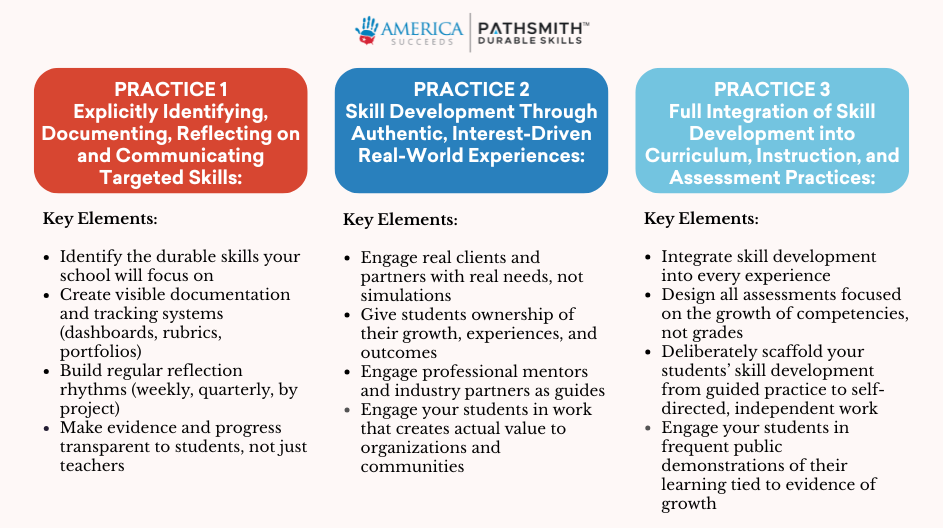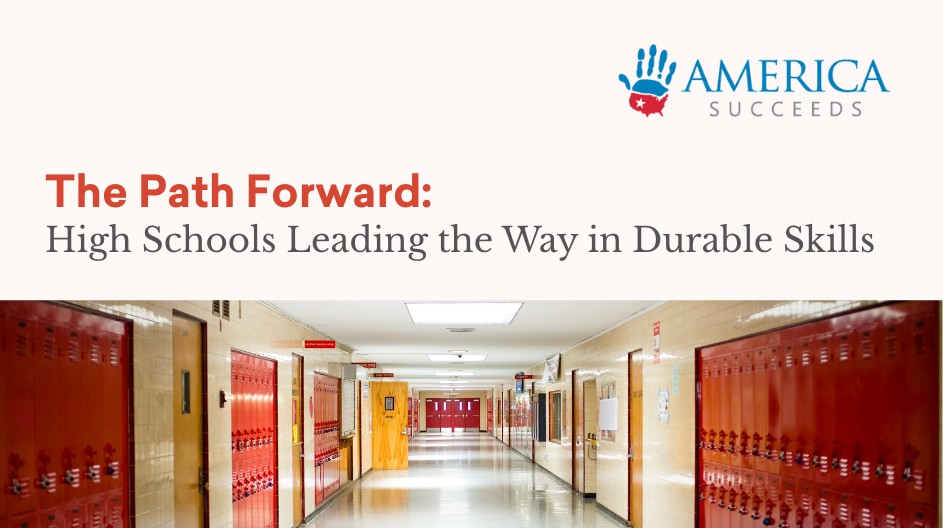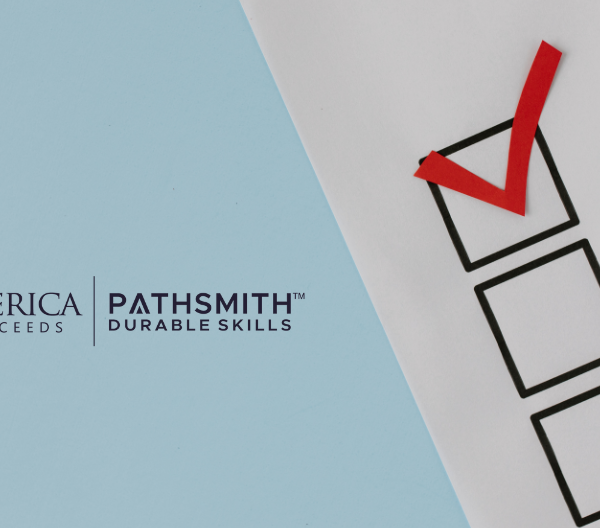The Practices Powering Durable Skills in High School
In our first post, we introduced the revolutionary three-part framework that emerged from our 16-month study of twelve innovative high schools and profession-based programs. Now, let’s dive deeper into how schools actually implement these practices to foster, support, and assist the development of their learners’ durable skills.
The Practices That Change Everything
Through our research analyzing over 200 student and educator interviews, we discovered that successful schools:
- explicitly identify, communicate, and focus on durable skills—those skills that transcend typical discipline- and domain-specific skills;
- engage their learners in authentic, interest-driven experiences—where those skills are pressed into action and grow over time in authentic, real-world experience with deliberate assistance, support, and guidance by the learning community;
- integrate the focus and deliberate support of their learners’ skill development through the curriculum, instruction, and assessment practices of the community.
It’s not one or the other of these activities that support learners’ skill development—it is each one of these activities working together that engages the development of learners’ durable skills.
Practice 1: Explicitly Identifying, Documenting, Reflecting on and Communicating Targeted Skills
The most effective schools don’t hope skills develop naturally—they architect deliberate systems to clearly communicate, reflect on, document, and celebrate their learners’ skill development.
Building 21 in Philadelphia demonstrates this through their four competency domains—Habits of Success, Wayfinding Experiences, NextGen Essentials, and Personal Development—with students progressing through levels at individualized paces. Every assignment explicitly connects to competencies with clear rubrics showing progression levels. Students can see exactly where they are and what reaching the next level requires.
Cedar Falls CAPS takes a different but equally explicit approach through their five performance standards that serve as the foundation for all learning experiences. These standards—Globally and Culturally Competent Servant Leader; Effective Communicator; Finding Purpose; Emerging Innovator; and Developing Professional—are introduced during onboarding and revisited every six weeks through formal evaluations. Students engage in written reflections at weeks 6, 12, and 18, and participate in ongoing reflection conversations with their instructors about how these standards manifest in their work.
Gibson Ek High School’s digital dashboard system transforms abstract competencies into visual, trackable growth. Students describe how the system helps them continuously track and reflect on the development of their skills through real-world projects, internships, and design labs. One alum reflected that the dashboard serves as a powerful tool for self-directed learning, giving students something concrete to work on when they feel stuck and helping them identify gaps in their learning across all their experiences.
Da Vinci Schools uses their four-phase design process—Care, Conceptualize, Create, and Critique—as both a learning framework and skill development tool. Students report that while the framework is required to be displayed in every classroom, more importantly, they’ve internalized it. One senior explained how organizing presentations around the four C’s made them think more deeply about their own thinking process. Students apply this framework across diverse contexts—from designing lamps that represent environmental issues like overfishing, to creating food truck projects that integrate physics motors with artistic design, to personal projects like cake decorating where they naturally apply the design cycle.
Practice 2: Skill Development Through Authentic, Interest-Driven Real-World Experiences
The second practice immerses students in learning by doing through authentic, real-world experiences guided by the deliberate coaching of industry experts, experienced mentors, and dedicated advisors who help students navigate personal learning projects, internships, and projects for social good.
In profession-based programs like Monett GO CAPS and Cedar Falls CAPS, students work directly with community members on real-world projects with clients, businesses, and organizations in the community. Businesses and other community partners submit real projects with real needs. Teams might develop marketing strategies for the Cedar Falls Public Library, create recruitment videos for the school district, or design social media campaigns that are actually implemented. Educators observe that when students know real professionals will evaluate their work—not just teachers grading papers—they rise to meet expectations they didn’t know they could reach.
Gibson Ek High School requires all students to pursue self-directed internships and personal learning projects that must address their five competency areas: Personal Qualities, Communication, Empirical Reasoning, Quantitative Reasoning, and Social Reasoning. Students work two full days weekly in professional settings, from engineering firms to hospitals to creative agencies. Through these authentic experiences, Gibson Ek students develop capabilities that organizations value, contributing meaningful work that makes a real difference in their placement sites.
One Stone in Boise showcases authentic learning through their Two Birds Creative Studio, where students run an actual creative agency serving real clients like Albertsons and Micron. Additionally, their Hatch incubator enables students to launch real businesses. Through partnerships like the one with Happy Family Organics, students developed predictive analytics models that diverted 12 tons of surplus produce to food banks annually. As program documentation notes, these projects demonstrate that high school students can solve real problems when given the right support and framework.
Monett GO CAPS demonstrates authentic learning through its Medicine & Healthcare strand, where students progress from hospital rotations to earning EMT-Basic certification through partnership with Barry-Lawrence County Ambulance District. Three seniors completed the certification, with one immediately beginning work as an EMT after graduation. Additionally, their student-led “Give Back” service project provides Thanksgiving meals across six Southwest Missouri communities. In the Business & Entrepreneurship strand, students worked with luxury van conversion startup 27 North, presenting market research directly to the CEO that influenced actual business decisions, with two students offered internships based on their work.
Practice 3: Full Integration of Skill Development into Curriculum, Instruction, and Assessment Practices
The third practice embeds skill development into curriculum, instruction, and assessment—forging a new pedagogy supported by new structures and ways of doing school.
STEM School Chattanooga demonstrates this through deliberate progression of their three tenets—Collaboration, Critical Thinking, and Innovation—across four years. Projects evolve from highly scaffolded freshman experiences with clear structures and frequent check-ins to entirely student-driven senior capstones. Students reflect on how the gradual release of responsibility transforms them into leaders without them even realizing it’s happening.
At Gibson Ek, students’ ongoing conversations with their advisors and quarterly exhibitions create powerful moments of reflection on the development of their skills and skill recognition. Students must articulate their skill development to their advisors and before panels of community members, their families, and professionals. They describe how every exhibition, internship interaction, and project presentation builds their skills, but the key difference is that the school explicitly names and tracks these capabilities. When students have to explain their growth to their community, experts, and advisors, they understand their real-world value.
At Building 21, assessment becomes the curriculum through their competency-based progression system. Every assignment explicitly connects to competencies with clear rubrics showing progression levels, with students advancing through the levels at their own pace. This transforms assessment from judgment into the organizing principle of learning itself. Students then know exactly where they are and how they can improve. The result: rather than using traditional grades which obscures actual capabilities, continually referencing actual competencies makes their growth in skills both concrete and personally meaningful, turning evaluation into a roadmap for where they need to go.

The Evidence of Transformation
These practices produce remarkable outcomes. Students who struggled to present become confident team leaders. Those who feared failure learn to see it as data for improvement. Students discover passions and capabilities they never knew existed.
But the most powerful evidence comes from how students describe their own growth. They reflect on journeys from nervous freshmen to seniors confidently leading team presentations to hospital administrators, building skills through incremental challenges—first presenting to peers, then teachers, then parents, then professionals.
Alumni report these skills open doors. Recent graduates share how in college engineering programs, they’re among the few who can effectively lead team projects. While they can learn technical content, the collaboration and communication skills from high school set them apart.
Your Path Forward
These schools prove that developing durable skills doesn’t require choosing between academic rigor and practical preparation—it requires integrating them in ways that enhance both. The three core practices provide a roadmap any school can follow.
Start where you are. Identify and make explicit and clearly communicate the durable skills your community wants to assist your students to build. Forge authentic partnerships with real-world community members and organizations—creating opportunities for your learners to develop the durable skills you have identified in authentic, interest-driven experiences. Integrate skill development into your assessment practices—and in particular engage your learners in the ongoing documentation, tracking, and reflection on their skill development. As these practices take root, they will naturally grow, transforming not just what students know, but who they become.
What’s Next: Deep Dives into Each Durable Skill
Over the next ten weeks, we’ll explore how the schools in our study support and assist the development of each of the ten durable skills—Communication, Leadership, Critical Thinking, Creativity, Collaboration, Metacognition, Character, Growth Mindset, Mindfulness, and Fortitude/Persistence. Through the lens of our three-part framework, we’ll provide you with several concrete examples of how schools explicitly identify each skill, create authentic experiences that develop it, and integrate its development into their educational DNA.
Next week: Communication.
Looking for K-12 durable skills resources to engage your students? Join the upcoming FREE PILOT to get early access!




